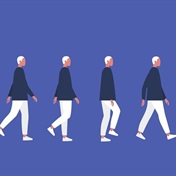In a study published in the US journal Proceedings of the National Academy of Sciences on Monday, the scientists said the same protein, beta-amyloid, which plays a key role in the brain-wasting Alzheimer's disease, also causes nerve cell damage in the eye from blindness-inducing glaucoma.
Recent studies have suggested connections between Alzheimer's and glaucoma and the new finding bolsters that evidence, said Francesca Cordeiro, a glaucoma specialist at London's University College and leader of the study."This is the first time anybody has provided evidence that the same protein in Alzheimer's causes retinal nerve cell loss," she said in a telephone interview.
Cause unknown
Scientists do not know what causes glaucoma, which affects some 65 million people worldwide.
Most treatments seek to lower the build-up in pressure from fluids in the eye, but the treatment does not work for as many as 30 percent of glaucoma patients, Cordeiro said.
She hoped the study of laboratory rats would lead to an alternative treatment for humans one day.
After the team identified the protein link between the two diseases, they administered a combination of experimental Alzheimer's drugs to laboratory rats, Cordeiro said.
The drugs stopped nerve cell death in rats with glaucoma and suggested that using more than one therapy at a time could also prove effective for treating Alzheimer's, Cordeiro added.
Combining treatments
"In Alzheimer's when you treat a patient you give them one drug that works on one protein," she said. "If you combine treatments you might have a better way of achieving your goal."
One of the drugs - bapineuzumab - is already used in clinical trials and Cordeiro said it could be available within a few years. Bapineuzumab is made by Ireland's Elan Corp and its US partner, Wyeth.
She also said the technology used in the research to examine nerve cell damage in the eye caused by the build-up of proteins gave doctors one more tool to detect Alzheimer's disease.
"The eye is an extension of the brain and we often forget that," she said. "This work emphasizes it is the only organ in the body you can look through and it is a tool people can use to look into the brain." – (Reuters Health)
Read more:
Alzheimer’s Centre
Acute glaucoma
August 2007




 Publications
Publications
 Partners
Partners










